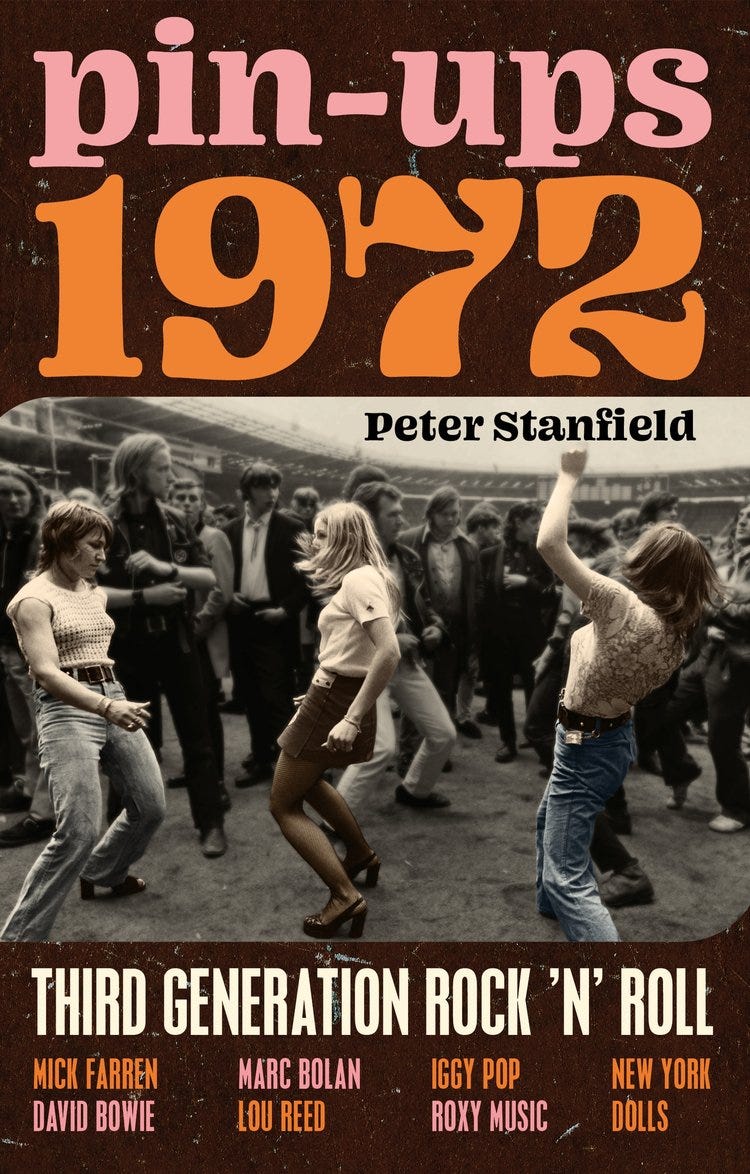As a young tot, I discovered “Second Generation Rock n’ Roll,” which is the Beatles/Rolling Stones and the British Invasion. The first generation is Elvis, Everly Brothers, Chuck Berry, and others. Peter Stanfield’s book is on the “Third Generation Rock n’ Roll,” which is 1972, and the likes of David Bowie, Roxy Music, and the New York Dolls. As a teenager, I fell under the spell of any musician that wore make-up. I loved the second generation, but my heart was thrown into the world of Glam, and now, I take it out of the trash, place it in my back pocket, and walk forward.
Stanfield’s book is focused on 1972, only Bowie, Marc Bolan, Roxy Music, Iggy Pop, Lou Reed, and a figure that I don’t know much about, Mick Farren. I know of Farren as a writer than a music maker, and he was in a prominent band, The Deviants, a proto-type punk band. But he was also a music journalist, and I believe I came upon his writings in the British music weeklies. This brings up the importance of music journalists of the 70s and how important they were in framing an era. Stanfield writes about figures like Nik Cohn, a writer of great significance and truly a Mod in thought and practice. Any journalist who can write about a disco dancer in Brooklyn in the 1970s, such as Saturday Night Fever, made up and based the story on his London Mod 1960s years is someone who knows how to use history on their behalf.
The music journalists of the 70s profoundly influenced pop music culture, and I’m pretty much a fan of their writing. Almost as important as the pop figures they covered, they also conveyed their identities and ego and put themselves into the story. Now, this formula can be a disaster in some hands, but Nick Kent, Chris Welch, Paul Nelson (especially Paul), Roy Hollingworth, Charles Shaar Murray, and others who wrote for NME and Melody Maker, soar as part of the narration. Bowie and Bolan were good at talking to the right people at the right time, and therefore that is why I’m here telling the tale and reading the remarkable book by Stanfield.
The Third Generation had a history of pop-making to make their present. For someone like Elvis, it must have been a strange and lonely journey to the top. By the time of Bolan’s fame with T. Rex, he at the very least had the history of The Beatle-mania, as well as having Ringo as a friend. Bowie spent years studying the past and participating in the second generation as a minor player. Elvis, the white Southern makeup-wearing weirdo, had to make plans as things happened. Or, at the very least, he had the talents of a late 19th-century circus barker, Col. Parker, to help him out.
Peter Stanfield wrote the best book on The Who, and their London called A Band With Built-In Hate. And like that book, Pin-ups 1972 is a fascinating look into what made 1972 a unique and essential year for British and Pop music. The music I heard in 1972, T. Rex, Bowie, and Roxy Music, was a moment when I realized that I’m living now, and 1972 is very much of the ‘now.’ Even now, looking back, I feel that year was and is very present to this very day.




Men who are confident enough to wear eyeliner are the best lovers.
I was kinda unstuck in time. I'd listened to jazz, soundtracks, musicals & 20th Century classical, and held rock and mainstream pop in disdain until running into US psychedelia (San Francisco, Los Angeles, Boston) in 1968 and then UK psychedelia about a year later. Then I learned about the British Invasion through friends who had followed it as it happened, and became a huge fan of Small Faces & The Move. When glam happened, I got into that, and only then started listening to some 1st generation artists like Jerry Lee Lewis & The Bobby Fuller Four. Was never really into Chuck Berry or Elvis.
Peter's book looks like something that I would enjoy, since that was one of the first eras that I experienced as it happened. I was lucky enough to see Bowie in 1972 at Carnegie Hall, and both T-Rex and The Stooges (sharing a bill with The MC5) in small clubs.
I first got into Mick Farren with his solo album Mona – The Carnivorous Circus, which I bought as an import in 1970. Then I got into The Deviants starting with Ptooff!, which was 3 years old by the time that I bought it.